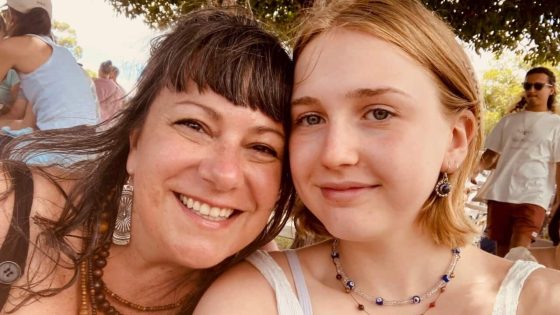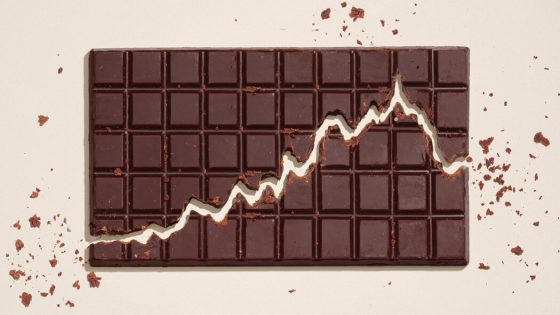This is the first of SBS’ You & Me series, which tells the same story from the perspectives of two different people.
When did you notice something was going on with Millie?
But then we started noticing that she was obviously losing weight. In September 2021, we took a family trip up to Noosa for the school holidays, and I think it was the first time we’d seen Millie without full clothes on in probably a year, and our hearts broke because we realised, holy crap there is something seriously wrong here.
(There were) comments from teachers even about me, about my activity. If I wasn’t keen on participating in sport they would harass me about it, belittle me, claim I was lazy.
Millie and her mum Julie. Source: Supplied
I was really insecure and ashamed about it. In H/PE I would go to the bathrooms and have extended breaks in there, and hope that I could stay in there until the next class because I didn’t want to face embarrassing myself in front of everyone.
I vividly remember in Year 6 starting to notice that all the girls around me had really toned lean bodies and I still had what I guess you’d call puppy fat and I felt really insecure about it. I started exercising a lot more frequently, and I managed to get healthier, and I should have stopped there.
I just wasn’t a sporty kid and I just got completely dragged down for that by certain teachers.
Millie
When did it start becoming an eating disorder?
By my 13th birthday, I was crying on the night of my birthday party because I had eaten cake. Eventually, all food was bad.
When did you start thinking it was an issue?
(Until that point) I thought: ‘I’m not as bad as those people they talk about who have to go to hospital.’ I was like: ‘That’s not me, I’m just trying to keep my weight off.’ I thought that’s what I had to do because other girls were just naturally like that. I had to starve myself if I wanted to be that way.
By my 13th birthday, I was crying on the night of my birthday party because I had eaten cake. Eventually, all food was bad.
Millie
How did you feel when you heard about Millie’s experiences?
The way she used to speak to us was not Millie, it was definitely anorexia. We started talking to anorexia as a separate entity … because if Millie was really rude or she threw food … we’d have to really calmly say: “That’s not Millie, that’s Rex speaking.”
How did you get through the difficult period after Millie left hospital?
After we were discharged from hospital there was no help, there’s no Butterfly Foundation (in Queensland) — which supports those affected by eating disorders and body image issues — so we were on our own. We found a private eating disorder psychologist. Unfortunately, it wasn’t going great. We then got into CYMHS, the Child and Youth Mental Health Service, about five months after discharge. They’ve got a huge waiting line to get in. That helped a lot. Now Millie sees a private psychologist who she gets along well with.
When you look back on that time, how do you feel about it?
Julie: It’s taken so much from us as a family. There’s no words to express how it feels to see your child basically fade away in front of your eyes. So for her to have to go through that, and to come out the other side is pretty exceptional. So we just need to keep moving forward.
It’s taken so much from us as a family. There’s no words to express how it feels to see your child basically fade away in front of your eyes.
Julie
What was the hardest part?
Financially, that’s something that’s probably catching up with us now. (And) we’ve lost friendships, and Millie’s obviously lost who she thought were her friends at the time.
Why did you lose friends?
Julie: I think because it’s inexplainable, there’s nothing that can compare to it. We’ve got a child who is a skeleton and she will not socialise. You can’t go to a barbecue or you can’t go over to someone’s place for dinner because she will not eat. I think it’s just too confronting for some people.
What helped you change your thoughts and start eating?
It was like: ‘I haven’t had a chocolate muffin in two years, and this is what it tastes like.’ It was almost like learning to enjoy food again.
What would you tell your younger self?
Focusing on being fit and healthy is so important but it’s when it becomes a hyper fixation that is so dangerous. So I would tell her to just chill out a bit.

Millie pictured from earlier this year. Source: Supplied
What do you think people need to understand about eating disorders?
Julie: The worst thing is the comments that come from adults. I think we, as human beings, need to stop commenting on people’s bodies. Adults would say to Millie: “You’re just blossoming out aren’t you?”, or “I wish I could eat that and still look like you.” The first thing you say about someone is about the physical aspects. Why can’t it be about how kind they are?
I think a lot of the struggle was that people glorify being unhealthily thin. I received a lot of praise around that even when I couldn’t sit down without my butt hurting. I think praising thinness isn’t something that we should do at all.
Millie
What do you wish your mum knew?
Millie: I would say to her: “I’m sorry and it was out of my control for a bit.” I wish people could understand that it’s not a choice, and as much as it hurts the people around you, and you feel like an absolute monster, and you act like a monster most of the time, you do wish to change yourself. No one likes to hurt the people they love, and it hurts you just as much to see yourself in that light.
What do you wish Millie knew?
Source Agencies



